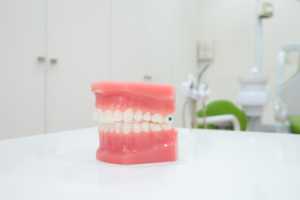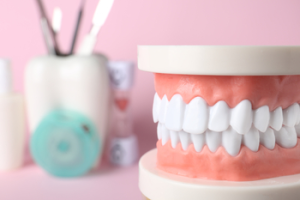Dentures have long been a solution for those seeking to restore their smiles after losing natural teeth. Crafted to look and feel like the real thing, they not only reinstate facial aesthetics but also play a pivotal role in the essential activities of eating and speaking. As people grow accustomed to their new teeth, a pressing question often emerges: “Can you sleep with dentures?” The answer isn’t a straightforward yes or no; it’s a blend of personal preference, oral health considerations, and professional advice. This article delves deep into the matter, weighing the pros and cons to provide a well-rounded perspective.
The Short Answer
Yes, it is indeed possible to sleep with dentures in place. Many people choose to do so, particularly when they initially receive dentures and are still accustomed to wearing them. It is an option for those who feel comfortable or find it more convenient to keep their dentures overnight.
Is it Advisable to Sleep with Dentures?
However, despite its possibility, dental professionals usually advise against sleeping with dentures regularly. The main concerns revolve around oral health, personal comfort, and the dentures’ longevity. Your gums, as well as the dentures, benefit from a nightly respite.
Exceptions to the Rule
There are exceptions to this general rule of thumb. In some situations, overnight wear might be necessary or preferred, but these are generally exceptions rather than the norm. It’s essential to understand the implications of sleeping with dentures and to take the appropriate precautions.
Benefits of Removing Dentures at Night
Dentures provide invaluable assistance in day-to-day life, restoring smiles and functionality to those missing teeth. But like every worthy companion, they, too, need their rest. Here’s why granting your dentures and mouth an overnight break is a decision replete with benefits and avoiding oral health problems.
Promotes Optimal Gum Health:
Your gums are like the bedrock of your oral cavity. Dentures, during their daily wear, exert consistent pressure on gums. A healthy dental routine involves removing dentures at night, offering your gums the necessary downtime, promoting blood circulation and healing minor irritations. This restful period is crucial in preventing gum inflammation and any other potential gum disease like tooth decay.
Thwarts Fungal Invasions:
Oral fungal infections, notably candidiasis or thrush, prey on moist environments. Wearing dentures non-stop, especially overnight, might offer opportunistic infections like denture stomatitis, an ideal breeding ground. By removing and cleaning dentures nightly, you significantly reduce the risk of these uncomfortable and unsightly infections.
Enhances Denture Longevity:
Dentures aren’t invincible. If you continuously wear partial dentures, it accelerates their wear and tear, potentially compromising their fit and function. Granting them a nightly break curtails this and allows for their thorough cleaning, preserving their integrity and appearance for the years to come.
Ensures Comprehensive Cleaning:
Nighttime becomes the perfect window for a deep-clean ritual. Submerging dentures in specialised cleaning solutions overnight effectively combats bacterial buildup, tartar, and potential stains. This ensures you greet each morning with a fresh, sanitised smile.
Fosters Restful Sleep:
Sleep quality is paramount. Even minor discomfort, like that from shifting dentures, can disrupt this precious rest. Sleeping without them eliminates potential disturbances, inviting a more peaceful slumber.
When Might It Be Okay to Sleep With Dentures?
While the general advice leans towards removing partial dentures during sleep, there are instances where keeping them in might be beneficial or necessary. Understanding these specific scenarios can help individuals make informed decisions.
Transitional Periods or Immediate Dentures:
Upon tooth extractions, dentists often provide patients with “immediate dentures” to use during the healing phase. In these initial days, wearing them continuously, including while sleeping, can be recommended to reduce swelling and help with the adjustment process. Individuals are usually instructed to start taking them out at night as healing progresses.
Personal Comfort and Psychological Ease:
Some people might feel vulnerable or self-conscious without dentures, especially if they share their sleeping space with a partner or are in unfamiliar surroundings. In these cases, personal comfort and mental well-being might prompt overnight wear. However, rigorous oral hygiene is essential if this becomes a regular practice.
Specialised Denture Designs:
There are specific types of dentures or dental appliances designed to be worn overnight, especially those used to treat conditions like sleep apnea or certain bite issues. Following the dentist’s recommendations is paramount in such cases.
Medical or Unique Scenarios:
In some rare cases, a dentist might advise patients to keep dentures in during sleep due to specific medical conditions or unique scenarios. Always rely on professional advice in such situations.
Tips for Those Who Choose to Sleep With Dentures
Choosing to wear a partial denture at night is a personal decision, and for those who do, it’s essential to be aware of the best practices to ensure oral health and denture longevity. Here are some tips for those who opt for overnight wear.
1. Ensure a Snug Fit:
Wearing ill-fitting dentures can exacerbate potential issues. A snug fit prevents slipping, reduces the chances of gum irritation, and ensures optimal comfort throughout the night. If your dentures feel loose, consult your dentist about adjustments or relining.
2. Prioritise Oral Hygiene:
Before hitting the sack, diligently clean your dentures with a denture cleanser. Use a soft-bristled toothbrush to gently brush the gums, ensuring the removal of any lingering particles or bacteria. Clean the dentures with denture cleaning solution thoroughly to ward off potential infections.
3. Consider Denture Adhesive:
A good-quality dental adhesive can help secure the dentures in place, minimising the risk of movement or potential choking hazards during sleep. Always choose a product that is easy to clean and doesn’t irritate the gums.
4. Stay Hydrated:
A dry mouth can increase the risk of cavities and infections. Drinking water before bed and keeping a glass nearby can help combat dry mouth, especially for those wearing dentures overnight.
5. Regularly Inspect for Damages:
Even the tiniest crack or damage can escalate when dentures are worn continuously. Inspect your dentures frequently for wear, cracks, or other damages. If you spot any anomalies, see your dentist promptly.
6. Consult Regularly:
Never underestimate the value of regular dental check-ups. If you wear dentures overnight, these visits become even more crucial. Your dentist can provide personalised advice, ensuring that wearing dentures at night is not detrimental to oral health.
Conclusion
Dentures bring smiles back to life, offering renewed confidence and functionality. Whether you wear them overnight or grant them a reprieve, staying informed and prioritising oral health is essential. Remember, like any aspect of healthcare, personalised guidance can make all the difference in navigating the intricacies of denture care.
If you have questions or concerns about your dentures or seek expert advice tailored to your unique situation, don’t hesitate. The team at My Local Dentists is here to support you every step of the way, ensuring that your smile remains radiant and your oral health impeccable.
Call My Local Dentists today at +61 2 9000 1239. Let’s journey towards a confident smile and uncompromised oral well-being together. Your smile deserves the best; we’re here to provide just that.
References
https://www.nhs.uk/conditions/dentures/
https://www.webmd.com/oral-health/dental-health-dentures


